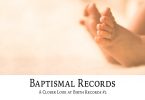There are several different reasons you might want or need to look up adoption records for your genealogical research. One reason is to find information about your own birth parents if you were adopted and were not told anything about them. Another reason is to look up information on the biological families of your adopted ancestors, so you can keep both a biological and adopted family history. You may also want to look up adoption records so you can research people in either of these scenarios in order to create a health history for yourself and your children. If you need to look for adoption records, here are some methods you can use to find them.
Determine if Your State is an Open or Closed Adoption Records State
This should be pretty easy to determine simply by Googling it or looking it up on your local clerk of the court website. In open adoption record states, the adoptee can request to see their original birth certificate and any other records pertaining to their adoption when they are 18 years old. Other open adoption states allow adoption records to become available to the adoptee after a certain number of years, so the record may not be available until well into the adoptee’s adulthood (you can petition for an early release of it with a court order). In closed adoption states, these records are always kept private and require a court order for you to get to see them. The most common reason stated for wanting to see these records in court order requests is because of health issues and wanting to know their biological health history for themselves and their children. You may or may not get the actual names of your birth parents through either method. It all depends on the state. The names of the birth parents may be redacted in order to protect their privacy. This may just be the last name (with the first name visible for each parent), or both names. You will get all other information, including the health history your birth parents submitted when signing the official adoption consent paperwork. Giving a health history is a relatively new thing that modern adoptions do. You may not find this information for older adoptions involving your ancestors.
Get a Lawyer if You Need To
If the records pertain to you, and you were born in a closed adoption state, as far as the records go, you will need to hire a lawyer to petition the court on your behalf to release the records to you. If you are truly desirous of this information or need it for a legitimate reason beyond genealogical research, such as a health history, then it is worth it to go to the trouble and expense of obtaining the records. They will reveal the secrets of your past and important information about your biological heritage.
Sign Up for an Adoption Reunion Website (or Several)
If you don’t end up being granted access to your adoption record, or if you don’t find the information you need in it, you should sign up for an adoption registry website. In fact, you should sign up for more than one. The more of them you are on, the greater chance there is that you will find someone who is looking for you. This may be a biological parent, and could also be another biological relative, such as a sibling, aunt, uncle, cousin, or even grandparents. You are much more likely to get the answers and information you are looking for if you get it directly from your biological relatives. If they were directly involved with the adoption, they can tell you, even more, allowing you to piece together the true and whole story of your adoption and how it came to be. As an added bonus, if you find someone looking for you on an adoption reunion website, then you know that your biological family truly wants to meet you, and will be much more likely to provide detailed information to you.
Do a DNA Test
DNA tests are just as legitimate of adoption records as other types. They will match you with your genetic relatives who have also tested, and may give you important health information, too, depending on the testing company you use. You can get connected to people who may not be direct relatives, but who share common ancestors with you. By sharing information with your DNA matches on the testing company’s website, or in private after you “meet” online, you can develop a biological family tree that is often a genuinely solid one. People who test with DNA companies are often extremely interested in genealogy, and will often have plenty of family history information to share with you. You can get a health history by asking questions of your matches and researching the people in your newfound family tree.
Techniques to Use if You are Searching for Adoption Records for Your Ancestors
If you are not the adoptee, but an ancestor of yours is, you have a few different options that are usually quite successful in finding out more about the biological family. DNA testing is one. By testing yourself or a relative who is also descended from the adopted ancestor, you can discover a lot about your ancestor’s biological family. You may even meet someone who knows about the adoption, either first-hand or through family lore. If the adoption was a long time ago (remember, adoption is nothing new… Moses was adopted), you may be able to find information on it in local old newspaper articles, or in the records of the old “orphan asylums” where your ancestor lived (or the asylum, as they were then called, closest to where your ancestor was born). Remember, too, that not every orphanage stay resulted in an adoption. If you find an ancestor listed as living in an orphanage in a census or newspaper record and you did not know that about them before, know that the vast majority of orphanage stays were temporary in the 19th century (the earliest time such records were kept in the United States). Some children aged out, usually at 14 with girls and at 16 with boys, and were apprenticed to others until they reached majority. Most, though, were eventually reunited with one or both of their parents. Orphanages were used as places for parents to temporarily place their children while they got back on their feet after the death or a spouse, a divorce, a financial issue, or a legal issue. Once the issue was resolved, the parent came back and reclaimed their child. So, if you discover an ancestor in an orphanage, look for the local repository that has the records of that orphanage. You may just discover your ancestor went home with their biological family.






